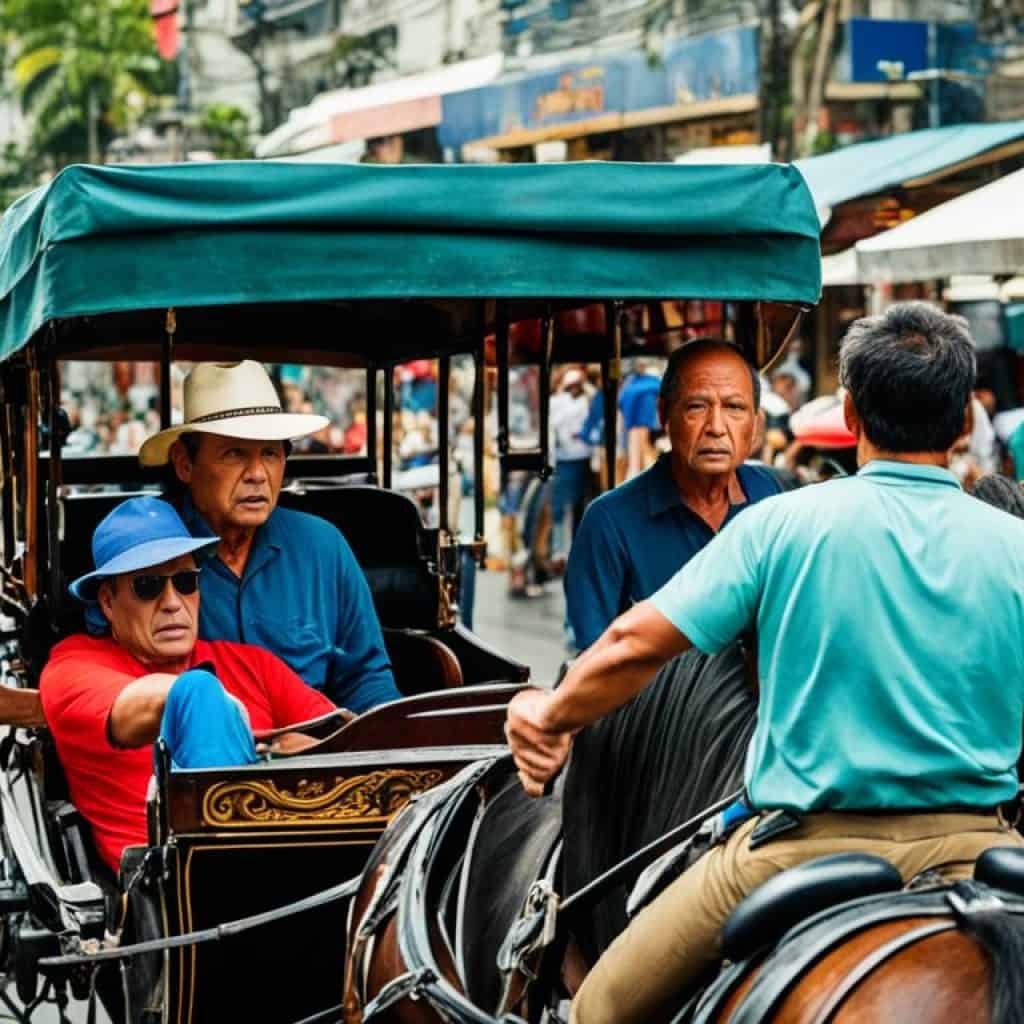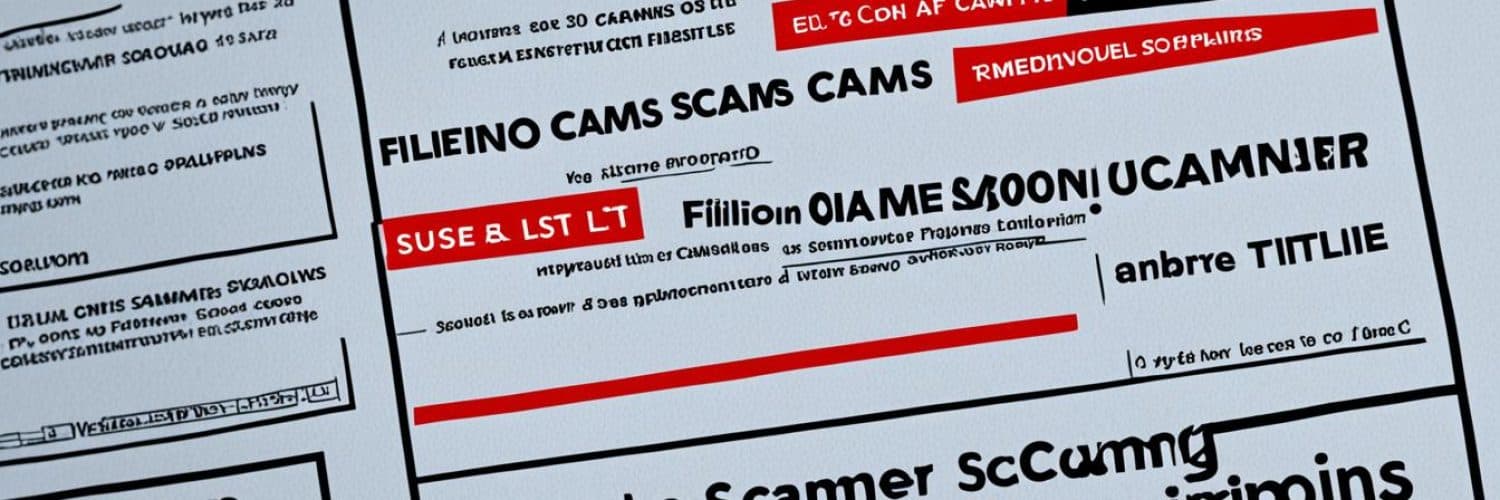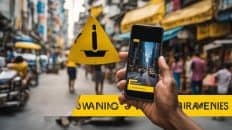Planning a trip to the stunning Philippines? While this tropical paradise offers breathtaking landscapes, vibrant culture, and warm hospitality, it’s crucial to be aware of the potential scams lurking in the shadows. Whether you’re strolling through the bustling streets of Manila or lounging on the pristine beaches of Boracay, scammers exist, and they target unsuspecting tourists like never before. Are you ready to protect yourself and enjoy a worry-free vacation in the Philippines?
From the notorious Tanim-Bala scam at airports to the cunning pickpocketing schemes in crowded areas, this comprehensive article will equip you with valuable insights into the common scams that tourists face in the Philippines. Discover effective tips on how to report and avoid these scams, empowering you to navigate your way through this beautiful nation with confidence.
The Tanim-Bala Scam - Beware of Bullet-Planting in Luggage
One of the most common scams in the Philippines is the Tanim-Bala or Bullet-Planting Scam, where scammers plant bullets in the luggage of unsuspecting passengers. They then demand a large sum of money to drop the charges. To avoid falling victim to this scam, it is recommended to lock your luggage with a padlock and be vigilant at all times. If you encounter this scam, approach airport police immediately.
This image visually represents the Tanim-Bala Scam, highlighting the deceptive practice of planting bullets in luggage to extort money from passengers.
Taxi Scams - Watch Out for Overcharging and Broken Meters
Taxi scams in the Philippines are unfortunately a common issue that many tourists encounter. Some taxi drivers take advantage of unsuspecting passengers by intentionally overcharging or manipulating their meters to charge higher fares, especially during rush hour or when they sense that passengers are unfamiliar with local fares. This can leave travelers feeling frustrated and taken advantage of.
To ensure safe transportation in the Philippines and avoid falling victim to taxi scams, there are a few precautions you can take. One option is to use ride-hailing apps like Grab, which provide transparent pricing and reduce the likelihood of overcharging. Another option is to rent a car from a reputable company, allowing you to have more control over your transportation and avoid reliance on taxis.
If you do decide to take a taxi, it’s important to be vigilant. Keep an eye on the meter and ensure that it starts from the base fare, as some drivers may tamper with it to increase the fare. If you notice any discrepancies or suspicious behavior, it’s best to trust your instincts and consider getting out of the taxi. Your safety and peace of mind should always be a priority.
If you do encounter a scamming taxi driver, it’s crucial to take note of their information, including their taxi number, and report the incident to their company or local authorities. This helps raise awareness about taxi scams and holds the driver accountable for their actions, ensuring a safer environment for both locals and tourists.
Stay safe and enjoy your journey!

Card Skimming Scams - Protect Your Personal Information
Card skimming scams are a serious threat in the Philippines, where thieves use electronic devices to steal personal information from ATM users. These scammers capture card details and commit fraudulent activities, putting your bank account at risk. It’s crucial to take preventive measures to safeguard your personal information and financial security.
When using ATM machines, especially in public areas, it’s important to be cautious and aware of potential skimming devices. Here are some steps you can take to protect yourself against card skimming scams:
- Inspect the ATM: Before inserting your card, carefully examine the ATM for any suspicious devices or attachments. Look for loose or poorly attached parts, additional card slots, or hidden cameras.
- Cover your PIN: When entering your PIN, use your hand or other objects to shield the keypad from prying eyes or hidden cameras. Be aware of anyone standing too close or trying to distract you.
- Use secure ATM machines: Choose ATMs located in well-lit areas, preferably inside bank branches or reputable establishments. These machines are more likely to have security measures in place to prevent skimming.
- Consider using your own pocket WiFi or VPN: Public WiFi networks may not always be secure, making your personal information vulnerable to hacking. Using your own pocket WiFi or a virtual private network (VPN) can provide an extra layer of security for your transactions.
By following these precautions, you can minimize the risk of falling victim to card skimming scams and protect your hard-earned money.
“Prevention is better than cure. Stay vigilant and protect your personal information from card skimming scams. Don’t let scammers take advantage of your financial security.”
Drink Tampering - Stay Alert and Drink Responsibly
When exploring the vibrant nightlife of the Philippines, it is important to be aware of the issue of drink tampering. Unfortunately, drink scams can occur in nightlife establishments, and it is essential to stay alert and take precautions to ensure your safety. By practicing responsible drinking and remaining mindful of your surroundings, you can minimize the risk of falling victim to these scams.
One of the most crucial rules to remember is to never accept drinks from strangers or leave your drink unattended. Unscrupulous individuals may tamper with drinks by spiking them with substances that can harm you or impair your judgment. Additionally, leaving your drink unattended increases the risk of it being used as a means to steal from or harass you. Always keep a close eye on your beverage and finish it or discard it if you need to step away.
Furthermore, it is important to be aware of your alcohol consumption and practice responsible drinking. Excessive alcohol intake can impair your judgment and make you more vulnerable to scams or dangerous situations. Pace yourself, know your limits, and avoid excessive drinking to ensure you can make informed decisions and stay safe.
To enhance your nightlife safety in the Philippines, consider the following tips:
- Stick to reputable and well-established nightlife establishments. These venues typically have security measures in place to protect their patrons.
- Travel in groups or with trusted companions. There is safety in numbers, and having someone you trust by your side can help deter potential scammers.
- Inform someone you trust about your whereabouts and plans for the evening. This way, they can check in on you or provide assistance if needed.
- Be cautious of individuals who seem overly interested in your personal information or who press you to divulge sensitive details. Protect your privacy and personal information at all times.
- If you suspect your drink has been tampered with or if you encounter any suspicious behavior, alert the establishment’s security or staff immediately. They are there to ensure the safety of their patrons and can provide assistance if necessary.
By following these guidelines and staying vigilant, you can enjoy the nightlife in the Philippines while minimizing the risk of falling victim to drink tampering or other scams. Remember, your safety is paramount, and responsible drinking is key to enjoying a memorable and worry-free experience.
“It is better to be safe than sorry. Take the necessary precautions and remain aware of your surroundings when enjoying the vibrant nightlife of the Philippines.”
| Key Points to Remember | Actions to Take |
|---|---|
| Never accept drinks from strangers or leave your drink unattended | Keep a close eye on your beverage and finish it or discard it if you need to step away |
| Practice responsible drinking and know your limits | Pace yourself and avoid excessive alcohol consumption |
| Stick to reputable and well-established nightlife establishments | Choose venues with security measures in place |
| Travel in groups or with trusted companions | There is safety in numbers and having someone you trust by your side |
| Inform someone you trust about your whereabouts | They can check in on you or provide assistance if needed |
| Be cautious of individuals seeking personal information | Protect your privacy and personal details |
| Alert the establishment’s security or staff if you suspect tampering | They can provide assistance and ensure your safety |
Remember, responsible drinking and vigilance are key to enjoying the nightlife while staying safe in the Philippines.
Pickpocketing Scams - Be Vigilant in Crowded Areas
Pickpocketing is a common scam in crowded areas of the Philippines, such as shopping malls and busy streets. Tourists and locals alike can fall victim to these skilled thieves who target unsuspecting individuals. To protect yourself from pickpocketing, it is crucial to be vigilant and take necessary precautions.
Here are some travel safety tips to avoid pickpocketing scams:
- Always be aware of your surroundings, especially in crowded places. Pay attention to anyone exhibiting suspicious behavior.
- Keep your belongings secure by using a cross-body bag or a money belt that is hidden under your clothing. Avoid carrying large amounts of cash or valuable items.
- Never leave your belongings unattended, even for a moment. Thieves can be quick and strike when you least expect it.
- Consider using a travel pouch or a hidden wallet to keep your money and passport safe.
- Take extra caution when visiting popular tourist spots known for pickpocketing schemes. These places tend to be crowded, providing the perfect environment for thieves.
Remember, prevention is key when it comes to avoiding pickpocketing scams. By staying alert and taking the necessary precautions, you can significantly reduce the risk of falling victim to these street crimes.
Stay one step ahead of pickpockets by being vigilant and keeping your belongings secure at all times.
Always remember that it’s better to be safe than sorry. Stay alert, protect your valuables, and enjoy your time exploring the beautiful streets of the Philippines.
Remaining Safe in Busy Streets
Busy streets can be a prime location for pickpocketing scams. Here are additional tips to stay safe in these bustling environments:
- Walk with confidence and purpose, appearing less vulnerable to potential thieves.
- Avoid displaying expensive jewelry or flashy gadgets that may attract unwanted attention.
- Stay in well-lit areas and avoid dimly lit alleyways or shortcuts.
- If possible, travel in groups, as thieves are less likely to target a large group of people.
Stay aware, be prepared, and enjoy your time exploring the vibrant streets of the Philippines without worrying about pickpocketing scams.
Online Banking Scams - Safeguard Your Personal Information
Online banking scams pose a significant threat to individuals’ personal information and bank account details, potentially leading to financial loss. Protecting yourself from these scams is crucial to ensure a secure online banking experience. Here are some essential tips to safeguard your personal information:
1. Use secure internet connections
When accessing your online banking accounts, make sure to use a secure WiFi connection or your mobile data instead of public networks. Public networks can be vulnerable to hackers who may intercept your personal data.
2. Consider using a virtual private network (VPN)
3. Keep your devices and accounts secure
Ensure that your devices, including smartphones, tablets, and computers, have up-to-date antivirus software and security patches installed. Additionally, regularly update your online banking passwords and enable two-factor authentication for added security.
4. Be cautious of phishing attempts
Be wary of emails or messages that appear to be from your bank, requesting personal information or login credentials. Legitimate banks will never ask for sensitive information through email. Always double-check the sender’s address and avoid clicking on suspicious links or attachments.
5. Monitor your accounts regularly
Stay vigilant and proactive in protecting your personal information when it comes to online banking. By adopting these preventive measures, you can minimize the risk of falling victim to online banking scams and enjoy a secure banking experience.
Safety Tips for Traveling in the Philippines
When exploring the beautiful country of the Philippines, ensuring your safety should be a top priority. By taking some simple precautions, you can have a memorable and worry-free trip. Here are some safety tips to help you stay safe while traveling:
1. Stay alert and be cautious
It’s important to be aware of your surroundings at all times, especially in crowded areas. Stay vigilant and trust your instincts if something seems suspicious. By staying alert, you can avoid potential dangers and keep yourself safe.
2. Verify taxi fare and insist on using the meter
When taking a taxi in the Philippines, ensure that the driver agrees to use the meter or negotiate a fair flat fare before getting in. This will help you avoid being overcharged and ensure a hassle-free ride.
3. Keep your important documents and belongings secure
Always keep your passport, identification, and other important documents securely stored while traveling. It’s also wise to use a money belt or a hidden pouch to keep your valuables safe. Be cautious of your surroundings and avoid flashing expensive items that may attract unwanted attention.

5. Follow local laws and customs
Respect the local laws, customs, and traditions of the Philippines. Familiarize yourself with the local customs, dress modestly in religious or conservative areas, and be mindful of cultural differences to avoid any misunderstandings or unintentional offenses.
By following these safety tips, you can have a safe and enjoyable travel experience in the Philippines. Remember, it’s always better to be prepared and cautious while exploring new destinations.
Common Scams in the Philippines - Awareness is Key
Scams can happen anywhere, but being aware of the common scams in the Philippines is crucial to protect yourself from becoming a victim. By staying informed and knowledgeable about different scam tactics, you can better navigate unfamiliar situations and avoid falling prey to fraud.
Staying informed about scams is your first line of defense. Educate yourself on the most prevalent scams in the Philippines, such as the Tanim-Bala Scam, taxi scams, card skimming scams, and water sports scams. Knowing the methods scammers use will help you recognize red flags and avoid potentially dangerous situations.
Scam Prevention Tips
Prevention is key when it comes to scams. Here are some tips to help you stay protected:
- Stay vigilant: Trust your instincts. If something seems suspicious, it’s best to err on the side of caution.
- Research: Before traveling to the Philippines, familiarize yourself with the most common scams in the country. Be aware of the tactics scammers use and the areas where they are more prevalent.
- Keep personal information secure: Protect your personal and financial information. Be cautious when sharing sensitive data and use secure internet connections when conducting online transactions.
- Use reputable services: When in doubt, rely on well-established and reputable services. Stick to licensed taxi operators, trusted money exchange establishments, and reputable tour agencies.
- Report scams: If you encounter a scam or become a victim, report the incident to the local authorities as well as your embassy or consulate. By reporting scams, you contribute to preventing others from falling victim to the same tricks.
Remember, being aware of scams and staying informed is your best defense against fraud in the Philippines. By following these scam prevention tips and staying vigilant, you can protect yourself and have a safe and enjoyable experience in the beautiful country.
The Money-Changing Scam - Beware of Dishonest Rates
The money-changing scam in the Philippines is a common tactic used by vendors to deceive unsuspecting tourists. They lure visitors by offering extremely high exchange rates, but the reality is far from what it seems. These vendors often resort to dishonest practices, such as shortchanging customers by removing money or using narrow slits in the counter to slyly take a portion of the exchanged currency.
If you’re planning to exchange currency in the Philippines, it’s essential to be cautious and protect yourself from falling victim to this scam. Here are some valuable tips to ensure a safe currency exchange:
- Choose reputable banks or hotels for currency exchange. They maintain transparent and fair exchange rates, minimizing the risk of fraudulent practices.
- Before confirming the exchange, inquire about the prevailing rates at different establishments. This will give you a better understanding of the exchange rates in the market and help you identify any significantly inflated rates used to deceive customers.
- Be meticulous when counting your money before leaving the establishment. Pay attention to the total amount received and ensure it aligns with the agreed-upon exchange rate.
Remember, vigilance is key when it comes to dealing with money changers in the Philippines. By being cautious and following these preventive measures, you can protect yourself from falling victim to the money-changing scam and enjoy a safe and reliable currency exchange.
Real-Life Scam Example:
“I traveled to Manila and encountered a money-changing scam at a small roadside stall. The vendor offered higher exchange rates than the reputable exchange centers nearby. However, when I counted the money after the transaction, I realized that I had been shortchanged. I learned my lesson and always exchange currency at trusted banks or hotels since then.”
The Manila Horse-Drawn Carriage Scam - Negotiate Fair Prices
The Manila horse-drawn carriage scam specifically targets tourists seeking a unique experience in the city. Unfortunately, some carriage operators take advantage of unsuspecting visitors by overcharging or demanding higher fares than initially agreed upon.
To protect yourself from falling victim to this scam, it is important to negotiate the final price before getting on the carriage. Firmly state that the negotiated price is the maximum amount you are willing to pay. By setting clear expectations upfront, you can avoid any surprises or attempts to overcharge you.
It is essential to be aware of the scam but also remember that many carriage drivers are honest and provide enjoyable rides. By exercising caution and communicating openly regarding the price, you can still have a positive and authentic horse-drawn carriage experience in Manila.
“Negotiating the fare beforehand puts you in control and ensures you’re paying a fair price for your carriage ride. Don’t be afraid to stand your ground and establish a mutually agreed-upon price.”
Tips for Avoiding Overcharging in Manila Horse-Drawn Carriage Rides
| Tip | Description |
|---|---|
| Research Fare Standards | Before your trip, familiarize yourself with the average rates for horse-drawn carriage rides in Manila to have a reference point for negotiations. |
| Negotiate Clearly | Discuss and finalize the fare with the carriage operator before boarding. Clearly state the maximum amount you are willing to pay to avoid overcharging. |
| Get Everything in Writing | If possible, ask for a written agreement stating the agreed-upon fare. This can serve as evidence in case of any disputes. |
| Stay Vigilant | During the ride, keep an eye on the route and duration to ensure that the fare aligns with the agreed-upon price. |
| Report Scams | If you encounter a carriage operator attempting to overcharge you or engaging in dishonest practices, report the incident to the local authorities or tourism office. |
By following these tips, you can navigate the Manila horse-drawn carriage scene with confidence, ensuring fair prices and an enjoyable experience.

Water Sports and Motorcycle Hire Scams - Inspect for Hidden Damage
In popular beach resort destinations like Boracay, Palawan, and Cebu in the Philippines, water sports enthusiasts and travelers looking for the thrill of motorcycle rides may unknowingly fall victim to scams. Scammers often take advantage of tourists by renting out water sports equipment or motorcycles with pre-existing damage, cleverly concealed by tape or other means. When customers return the equipment, scammers blame them for the damage and demand exorbitant repair fees.
To avoid being caught in these scams and ensure a hassle-free experience, it is highly recommended to organize water sports activities and motorcycle rentals through reputable sources, such as your hotel or well-established tour companies. These trusted providers often have stringent quality control measures and maintain their equipment in good condition, minimizing the risk of encountering hidden damage charges.
Before renting any water sports equipment or motorcycles, take the time to carefully inspect them for any signs of hidden damage. Look for scratches, dents, or any irregularities that could compromise your safety or result in additional charges. If you notice any issues, inform the rental company immediately and request another piece of equipment or vehicle.
By being proactive and exercising caution, you can protect yourself from falling victim to water sports and motorcycle hire scams in the Philippines. Enjoy your adventures with peace of mind, knowing you’ve taken the necessary steps to avoid hidden damage charges and have a safe and memorable experience.
Quick Tips:
- Organize water sports activities and motorcycle rentals through reputable sources.
- Inspect water sports equipment and motorcycles for hidden damage before renting.
- Report any issues immediately to the rental company.
Conclusion
In conclusion, the Filipino Scammer List serves as a crucial resource for anyone traveling to the Philippines. Being aware of common scams, having scam awareness, and knowing how to report scams are essential steps in staying safe and protecting yourself from falling victim to fraud. By practicing scam prevention and taking necessary precautions, you can ensure a safe and enjoyable trip to this beautiful country.
Remember that scammers exist, but by staying informed and alert, you can outsmart them. Stay vigilant and trust your instincts if something seems suspicious. If you encounter any scams, don’t hesitate to report them to the appropriate authorities or tourist assistance centers. It’s important that we all work together to combat scams and keep the Philippines a safe destination for travelers.
As you embark on your Philippine adventure, keep the Filipino Scammer List close at hand and share it with fellow travelers. Empower yourself and others with scam awareness and knowledge. With the right information and precautions, you can protect yourself from scams and have a memorable and worry-free experience in the Philippines. Stay safe and enjoy all the wonders this country has to offer!
FAQ
What is the Tanim-Bala scam?
The Tanim-Bala or Bullet-Planting scam involves scammers planting bullets in the luggage of unsuspecting passengers at airports. They then demand money to drop the charges. To avoid falling victim to this scam, lock your luggage with a padlock and be vigilant. Report any encounters to airport police immediately.
How can I avoid taxi scams?
To avoid taxi scams in the Philippines, it is recommended to use ride-hailing apps like Grab or rent a car from a reputable company. If you encounter a scamming taxi driver, take note of their information and report the incident to their company or authorities.
What are card skimming scams?
Card skimming scams involve thieves stealing personal information from ATM users to commit fraud. To protect yourself from these scams, be cautious when using ATMs, check for suspicious devices, and consider using your own secure internet connection or a virtual private network (VPN).
How can I stay safe from drink tampering?
To stay safe from drink tampering, never accept drinks from strangers and always keep an eye on your drink. Never leave your drink unattended, as it can be spiked or used for theft or harassment. Practice responsible drinking and be aware of your surroundings.
What precautions should I take for pickpocketing?
To protect yourself from pickpocketing, be aware of your surroundings, keep your belongings secure, and avoid carrying large amounts of cash or valuable items. Take extra caution in crowded areas, such as shopping malls and popular tourist spots known for pickpocketing.
How can I prevent online banking scams?
To prevent online banking scams, use secure internet connections and consider using a virtual private network (VPN) for added privacy. Avoid accessing sensitive information on public networks, as scammers may hack into them.
What safety tips should I follow while traveling in the Philippines?
To ensure your safety while traveling in the Philippines, stay alert, be cautious in crowded areas, verify taxi fares, and keep your important documents and belongings secure. Learn basic phrases in Tagalog for emergencies and consider using language learning apps to enhance your communication skills.
Why is it important to be aware of common scams in the Philippines?
Being aware of common scams in the Philippines can help you avoid becoming a victim. By staying informed and knowledgeable about different scam tactics, you can better protect yourself from fraud. Remain vigilant and trust your instincts if something seems suspicious.
How can I avoid the money-changing scam in the Philippines?
To avoid the money-changing scam in the Philippines, exchange currency at reputable banks or hotels. Always count your money before leaving the establishment to ensure you are not shortchanged.
How can I protect myself from the Manila horse-drawn carriage scam?
To protect yourself from the Manila horse-drawn carriage scam, negotiate the final price before getting on the carriage and state that it is the maximum amount you will pay. Be aware of scams, but also keep in mind that many drivers are honest and provide enjoyable rides.
How can I avoid water sports and motorcycle hire scams?
To avoid water sports and motorcycle hire scams, organize activities through reputable sources like your hotel. Carefully inspect rental vehicles for hidden damage before renting them to avoid being blamed and charged for pre-existing damage.







Add comment